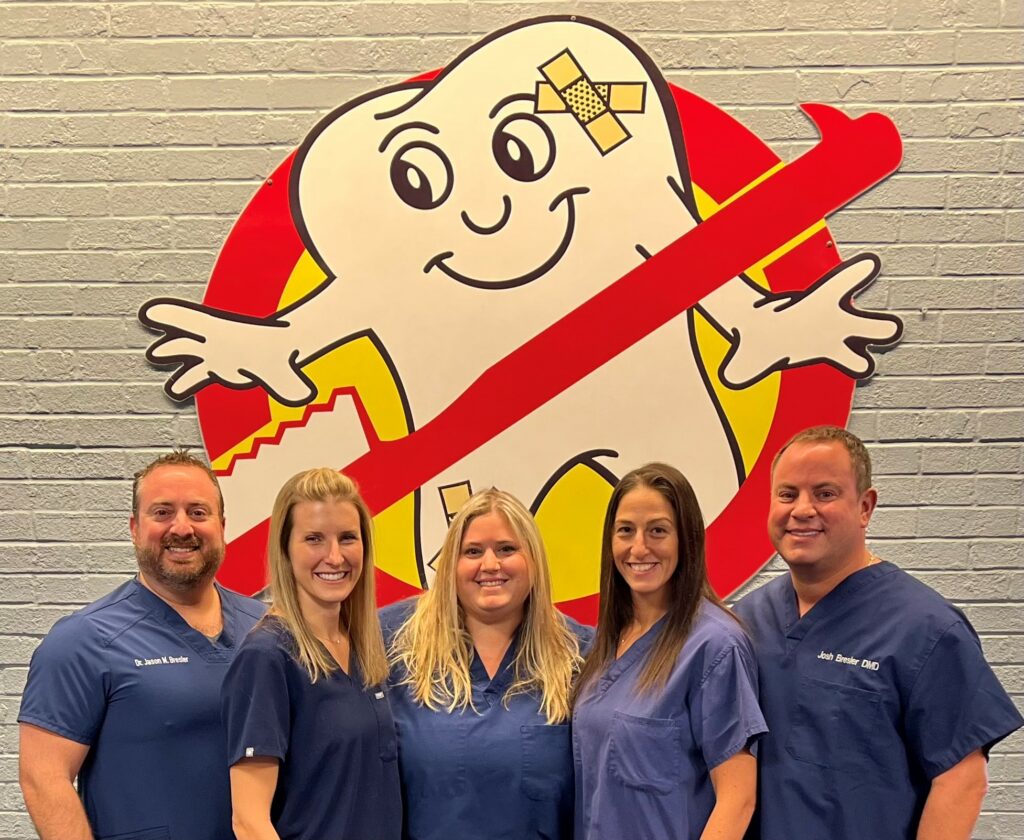As Benjamin Franklin famously said, “An ounce of prevention is worth a pound of cure.”
The focus of Cavity Busters’ early childhood education program may be on preventative care, but these educational visits have a hidden benefit, too. They familiarize children with dentists and oral hygiene, which Rachel Bresler says can help ease children’s fears about visiting the dentist.
“Almost everything that can go wrong in dentistry disease-wise, not including traumas and things like that, is preventable. So, the earlier we can educate children and soon-to-be parents the better off those kids are going to be,” Jason Bresler says.

Jason, Rachel and Josh Bresler are three siblings who all become pediatric dentists – just like their father. They own and operate Doc Bresler’s Cavity Busters together, with a mission to educate and inform parents and their kids about proper dental hygiene – for free.
“I think we all grew up watching our dad really love what he did, and he loved being able to make a difference – to have an impact on society in a positive way,” Josh Bresler says. “Pediatric dentistry gives us all the opportunity to do that.”
The trio’s practice has a team of experienced dental educators who visit preschools, daycare centers, kindergartens, elementary schools (through grade 2) and summer camps throughout Philadelphia and the suburbs.
Doc Bresler’s Cavity Busters’ Community Outreach department sends these educators to provide engaging, age-appropriate lessons and goodie bags and materials for parents.
Two major aspects of pediatric dentistry are early intervention and prevention, according to Rachel Bresler. By having the educational sessions be free, the dentist trio says they’re able to make them more accessible.
“Knowledge shouldn’t cost anything – especially for dental health. It should be universal. Everyone should know what causes cavities and what can be done to prevent cavities,” Jason Bresler says.
“One of our biggest battles that we deal with on a daily basis is trying to transform the mindset of irritation that comes in with those fears, see it from their perspective and present the things we’re going to have to do in a more kid-friendly way,” Rachel Bresler says.
Some of the things pediatric dentists do to make visits easier on children include giving tools kid-friendly names, offering stickers and desensitization visits.
For neurodivergent children or children who might have had negative experiences in the past, parents can ask pediatric dentists about desensitization visits. These are visits where the child gradually gets used to the dentist environment by spending time there and becoming familiar with the faculty and tools.
“They might just sit in the waiting room for the first appointment. We’ll say hi and they’ll get a toothbrush and that’s the whole appointment,” Josh Bresler explains. “We’ll slowly allow the child to acclimate to the unknown environment and proceed carefully.”
Parents can help their children have a more positive experience at the dentist by following proper home care and dietary habits, maintaining a regular schedule of dental cleanings and making sure kids have access to reliable kid-friendly information about the dentist, the Breslers say.
“Kids have access to so much information, more so than ever before. They’re able to look on YouTube and TikTok and they can see some things that are scary or things that portray dentist visits as a terrible or fearful event,” Josh Bresler says. “But parents are sometimes their own worst enemies because they might tell children, ‘You know, if you eat that you’re going to go to the dentist and they’re going to have to give you a big needle in your mouth,’ and that gets kids scared.”
Josh Bresler also advises parents against using fear of the dentist to get kids to brush their teeth, because that “instills a deep fear in a lot of children,” which makes it difficult for dentists to do their work without causing children unnecessary stress.
Parents can visit cavitybusters.com for free educational information to learn more about how they can keep their child’s teeth healthy and strong. Doc Bresler’s Cavity Busters has office locations in Doylestown, Roxborough, Dresher, Northeast Philadelphia, Jenkintown, Newtown Square, South Philadelphia and Lower Northeast Philadelphia.
Baby’s First Tooth – Tips!
It’s never too early to look out for your baby’s oral health. Even before their first teeth come in, the gums can be a hotspot for bacterial growth. Here’s what the Breslers say you can do for your baby.
Jason Bresler: The recommendation from the American Academy of Pediatric Dentistry is to have your baby’s first appointment within 6 months of the eruption of their first tooth, then every 6 months after.
Josh Bresler: The most important thing is to start brushing them as soon as the teeth come into the mouth. Even though it’s just one tooth, that one tooth is important. Use a tiny amount of toothpaste and get kids used to brushing before bed. Even if they cry or get upset, the more you do it, the more routine it becomes.
Rachel Bresler: If you’re doing middle-of-the-night feedings, keep a baby washcloth handy to wipe down the teeth and gums. Make sure the mouth is really clear of any of those liquids.






